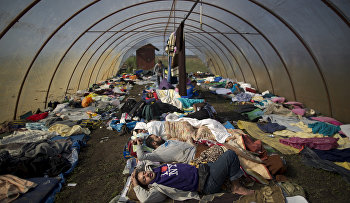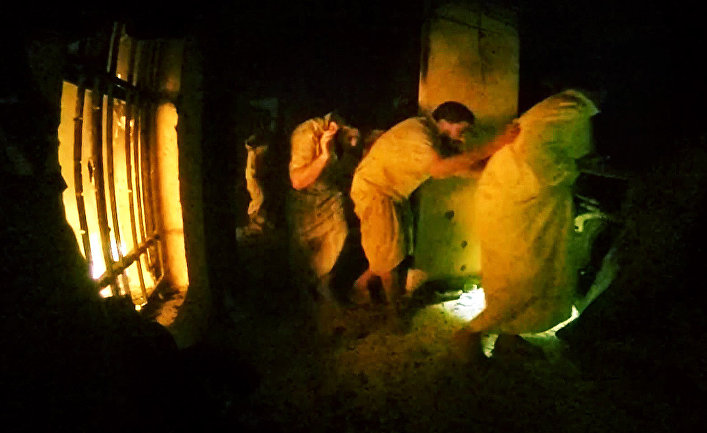Iraqi government didn't feel embarrassed to declare it has just heard from the media about the United States commando operation that rescued 69 Kurdish hostages in northern Iraq a couple of days ago. It's been reported that Iraqi authorities will meet representatives of the international coalition to get information related to this attack. It's understandable that the Iraqi PM, Haider al-Abadi doesn't want to strain the relations with Washington, which is presumably leading a 60-state coalition against ISIL in Iraq — but is this really enough to justify such a flagrant violation of the Iraqi sovereignty that occurred without consulting the local government? In fact, this operation raises questions — regarding the identity of these "lucky hostages" who the US was urged to send its troops for rescue risking their lives — and questions regarding the standards that determine American ground intervention.
New video shows U.S., Kurdish and Iraqi forces in raid to free about 70 hostages from ISIS. https://t.co/SzUJyS8CVJ pic.twitter.com/qknicvtVkx
— CNN Breaking News (@cnnbrk) October 25, 2015
The US administration refused to answer questions about the nature of relationships with those hostages, which leads to questions weather they might be agents of the international coalition on the ground. However, this doesn't grant the United States the right to ignore the fact that they are in fact Iraqi citizens, being held inside a state that is supposedly sovereign. While the US administration's statements always indicate that they are working to support al-Abadi's government, its boot on the ground policy is undermining the credibility of the local government and weakening it, starting with the US's failure to implement arms deals — including those fully paid by Iraq, and also the absence of the efficient air-support that is necessary to accelerate recovery of Al-Anbar from ISIL. Further, such military operations lacks any political sense.
However, this operation can't be separated from the United States usual approach that is characterized by arrogance and its unilateral nature. This approach is the cause for the failure of the declared task of the coalition in Iraq for more than a year. For instance, the American authorities refused to provide coalition's members, including the Baghdad government, with intelligence information on ISIL, which caused the de facto withdrawal of most of the coalition's parties, at least in terms of raids. Military situation in Iraq remains almost at a standstill. Meanwhile the militias are strengthening their power on the ground, even inside the Iraqi army itself, which makes the government inactive, watching its credibility breaking down.
The firefight that killed a US special operator in Iraq on Thursday wasn’t supposed to happen @paulmcleary reports https://t.co/7Lz1QtNIiv
— Foreign Policy (@ForeignPolicy) October 22, 2015
The US didn't feel any necessity to intervene when hundreds of Iraqis — of all sects and races — were taken hostage or cold-bloodedly executed by ISIL fighters, where the victims were Sunni, Shiia, Christian, or Izidi. This emphasizes that the United States only cares about protecting its interests and "friends" who work for them on the ground. Of course, Washington doesn't care about political fears this particular raid might cause, or weather it will boost the already existing "sectarianism" on the ground.

No doubt, such behavior on the part of the US, was the reason behind the repetitive statements of al-Abadi calling for Russia's aid in the fight against ISIL in Iraq. Iraqi PM was short of making an official request to Moscow, with a condition that the Russian government would send a clear message that they are ready for such decision at the moment. The full picture is becoming more clear in that US's unilateral operation, shows Iraq as a stateless land, or almost that. On the one hand, there are Turkish raids in the north against the Kurds, where the official protests were useless. On the other other hand, the US ignores Iraq's central government, in addition to the Iranian military domination that is escalating its battle against the US influence in the region, let alone the nonstop hit-and-run attacks by ISIL in the area.
As for the political reforms, which appeared to have some positive effect at first, in the end didn't produce anything, other than producing limited measures that failed in meeting the demands and ambitions of hundreds of thousands of protesters who sought reconstruction of the rotten political regime that is infected with corruption, sectarianism, and pure failure. What future awaits Iraq in the light of such indefinite reality?






